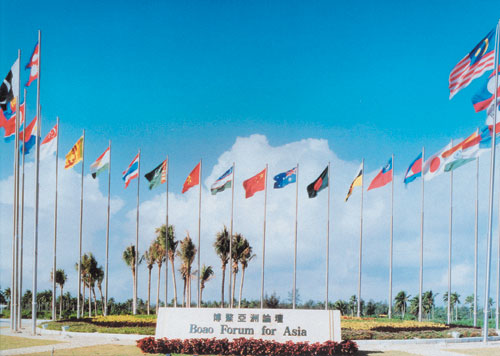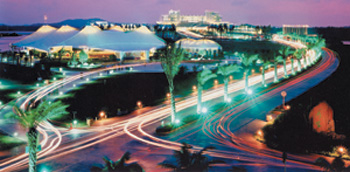
The Boao Forum for Asia, which is a non-official international conference body, mainly consists of Asian countries and regions and is open to other regions as well. It provides people from all quarters with a place for high-level dialogue on such issues as economic development, population and environment in Asia. This reflects the aspiration of Asian countries for common development through enhanced dialogue and cooperation against the backdrop of economic globalization. And it is also the call of the times.
by Chinese President Jiang Zemin
The first annual conference of the Boao Forum for Asia (BFA) will be held on April 12-13 in Boao,the BFA's headquarters in south China's island province of Hainan.
About 1,000 participants including state leaders, ministers, celebrities, scholars and business representatives, will attend the annual conference. Chinese Premier Zhu Rongji will head a delegation to the conference and deliver the keynote address, and other senior Chinese officials and the first Chinese Ambassador to the World Trade Organization Sun Zhenyu would also attend the conference. Thai Prime Minister Thaksin Shinawatra will attend the first annual meeting of the Forum and will deliver a speech at the forum. Also joining the brainstorm will be President of the Asian Development Bank Tadao Chino, former leaders from Australia, the Philippines, and South Korea and entrepreneurs from world-leading companies.
The general theme of the conference is "a new century, new situation and new task -- cooperation and development of the Asian economy", and will begin with a plenary session and three concurrent sessions, namely, a regional cooperation series, a sector strategy series and a country outlookseries.
Zhang Xiang, acting secretary-general of the Bo'ao Forum for Asia (BFA), said that the forum's first annual conference would discuss regional co-operation for trade and investment liberalization and monetary reform, international finance, securities, service industry and analyses of the economic outlook of major Asian countries in the region.
"The problems we are facing today are also affecting the economic communities of the United States, the European Union and Japan, which indicates that it is a problem of global concern," said Zhang. "We will invite political leaders, entrepreneurs and eminent scholars to Bo'ao at our annual conference and deliberate on the current issues and the future prospect of Asia and the world."
Economic globalization has become a trend in the world and has been accelerated in recent years. To brace for challenges from economic globalization, the pace of regionalization has also been accelerated in the world.
Along with the expansion of integration in North American Free Trade Zone and European Union, the South American Andes Commonwealth has worked out a goal of bringing about a regional common marketsintosreality within five years.
Despite the suffering from problems such as natural disasters and tribal disputes, South African Development Commonwealth formally launched a Free Trade Zone Agreement in September last year and planned to lower tariffs on all non-sensitive commodities from states with agreement memberships to nil in eight years and fully realize free trade in the region by the year of 2012.
The integration of ASEAN has been accelerating since the Asian financial crisis ended. Singapore, Thailand, Malaysia, Indonesia, the Philippines, and Brunei had decided to establish a free trade zone with a tariff rate ranging from zero to five percent by 2002, one year ahead of the original plan. Compared with regionalization in other areas, there is no organized forum institution in Asia that is directed by Asians, or is aimed at promoting exchanges and cooperation among different countries in Asia with Asia's interest and concept being takensintosaccount.
Amid economic globalization, more and more countries feel the necessity of finding countermeasures to realize greater profits and avoid damages, and of improving Asia's overall competitive capacity by enhancing dialogues and coordination, as well as expanding regional cooperation.
Asia Forum is suggested as a fine tool to increase cooperation and dialogues, to avoid brinkmanship and poverty, to make progress with the global trend and to realize common prosperity in the region and the world at large.
With emphasis on Asia, Asia Forum will have a great number of topics to be tackled, but economic globalization will be one of the most important topics on the agenda. It will help bring about a powerful international network in Asia and offer constructive opinions and suggestions for promoting economic cooperation and exchanges among Asian countries, and the fusion of Asian and global economies.
In addition to holding regular unofficial Asian economic high- ranking and other relevant meetings, Asia Forum will also execute various kinds of suggestions, and carry out economic and social development ideas via economic, technological exchanges, international training courses, development of human resources, eventually advancing exchange and fusion of Asian and global economies.

Background: The Boao Forum for Asia
The Boao Forum for Asia (BFA) is the first high-level forum organized by Asians aimed at promoting the exchanges and co-operation among Asian countries as well as between Asia and the rest of the world.
Following the Asian financial crisis of 1997, more and more Asian countries have realized that economic globalization and the development of the New Economy represent both chances and challenges for a diversified Asia that have to be handled from an Asian point of view.
The economic integration of Europe, and the development of the North American Free Trade Zone made Asian countries realize that Asia is lagging behind in regional economic co-operation. They have strongly felt the need for enhanced dialog, coordination and co-operation among Asian countries and regions.
In September 1998, former Australian Prime Minister Bob Hawke, former Japanese prime Minister Morihiro Hosokawa and former Filipino President Fidel V.ramos put forward the proposal to establish an‘Asian Forum’, similar to the‘World Economic Forum’headquartered in Davos.
On October 8, 1999, H.E. Hu Jintao, Vice Chairman of China met with H.E. Fidel V. Ramos and H.E. Bob Hawke who came to China especially for the“Asian Forum”. After the briefing by initiators of the conceived forum, H.E. Hu Jintao said that the Chinese Government always supports and attaches importance to multi-level, multi-channel and multi-type of regional cooperation and dialogue, the establishment of the forum would be conducive to promoting understanding, trust and cooperation among the countries of the region.
The Inauguration Ceremony of the BFA was held on Feb.26-27, 2001 in Boao, Hainan Province, China. Former leaders from 26 countries including H.E. President Jiang Zeming, H.E. Mr. Yasuhiro Nakasone, former Prime Minister of Japan, H.E. Mr. Fidel V. Ramos, former President of the Philippines, H.E. Mr. Bob Hawke, former Prime Minister of Australia, H.E. Mr. Sergey Terechshenko, former Prime Minister of Kazakhstan, H.E. Mr. Punsalmaa Ochirbat, former President of Mongolia attended the Ceremony. H.E. Dr Mahathir bin Mohammad, Prime Minister of Malaysia, H.M. Birendra Bir Bikram Shah Dev, the late King of Nepal, H.E. Mr. Nguyen Manh Cam, Deputy Prime Minister of Vietnam also graced the occasion as our Guests of Honour by addressing the Ceremony. The BFA was officially launched at the Ceremony.“Declaration of the BFA”,“Guidelines of the BFA Charter”were adopted during the Ceremony. The Inauguration was a great success and gained wide spread concern from the international community.
Nature
The BFA shall be a non-government and non-profit international organization.
Objectives
The BFA's objective is to be an Asia-based and globally-visioned forum, which can provide a platform for political, business and academic leaders from all over the world to speak together on an equal footing.
The Forum will provide a high-level venue of dialogue for governmental officials, business leaders and academia to discuss various issues like economic, social development, population and environment, etc.
Vision
-Strive to become the premier Forum, promoting the development goals of Asian countries through greater regional economic integration.
Mission
-- To generate, through high level interaction between Governments and business leaders, strategic initiatives for the deepening of trade, investment and technology partnerships in Asia.
-- To enhance inter-cultural understanding and fostering a deep sense of social responsibility among business communities in Asia.
-- To develop an enabling environment for creating Asian business synergies for comprehensive and sustainable economic progress.
-- To nurture the concept of intra-regional institutional networking for identifying new global trade and investment opportunities.

-- To promote region-wide strategic alliances to seize trade, industry and investment opportunities emerging from a globalizing world.
-- To provide intellectual leadership for developing human capital and conducting research on areas of special importance to the region and its international partnerships.
Strategies
-- Convene conferences, seminars and workshops on a regular basis, to discuss important issues relating to Asian development, trade, investment and environmental protection.
-- Develop and promote closer inter-relationships between the Forum, business communities and the Government.
-- Complement the regional initiatives underway to intensify collaboration between the Governments and business communities on trade and investment matters.
-- Identify and disseminate information on emerging business and investment opportunities.
-- Serve as an early warning system for the business communities on the impact of global trade and investment liberalization measures.
-- Serve as a clearing-house for promoting joint ventures between business communities operating in Asia.
-- Undertake feasibility studies and provide consultancy services to business communities and governments.
To become a global center for research and graduate training to equip business communities with better management and technological capabilities.
Functions and Services
The BFA's functions and services as the six Es, namely, economic forum, exchange of information, evaluation based on research, education and training, exhibition and exposition, and E-service.
| ![]() 本网站由北京信息港提供网络支持
本网站由北京信息港提供网络支持


